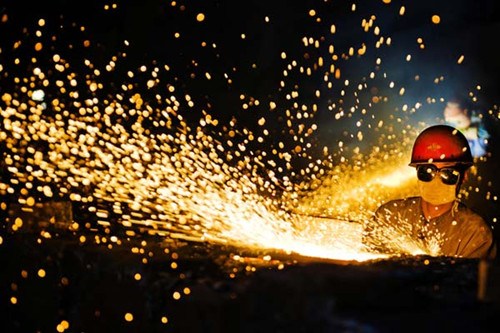
A worker cleans and polishes steel parts at the CITIC Heavy Industries Co Ltd plant in Luoyang, Henan province. China's official PMI has remained above 50 for seven consecutive months, indicating an expansion in factory production. HUANG ZHENGWEI/FOR CHINA DAILY
Analysts warn momentum could weaken
Growth in China's manufacturing sector slowed in April, and analysts fear that could now weaken momentum in the country's overall economic recovery in the second quarter, adding pressure on policymakers to increase their efforts at stimulating domestic demand.
China's Purchasing Managers' Index of the manufacturing sector declined to 50.6 last month from 50.9 in March, against 50.1 in February, said the National Bureau of Statistics and China Federation of Logistics and Purchasing.
The official PMI has now remained above 50 for seven consecutive months, indicating expansion in factory production. Any reading below 50 means contraction.
Zhang Liqun, an analyst from the Development Research Center of the State Council, or China's cabinet, said the latest PMI reading is still within a stable range.
But he added the weakened growth trend may suggest a possible slight slowdown in the overall economy, and measures should be taken to stabilize the domestic market, and ensure a sustainable rebound.
He said the expectations of manufacturing enterprises had started to turn pessimistic as purchase prices of raw materials had continued to drop sharply.
Industrial company profits also increased slower during the first three months, to 12.1 percent from a year earlier, compared with 17.2 percent from January to February, the NBS said.
April's PMI for small enterprises, meanwhile, retreated to 47.6 from 49.3 in March, the 13th consecutive month it has been lower than 50. It was 51 for large companies, down from 51.4. The figure was 50.7 for medium-sized companies, up from 50.3.
According to the NBS figures, six of 21 manufacturing industries showed contraction in April, including petroleum processing and coking, farm and sideline food processing, as well as the black metal smelting and rolling processing industries.
Zhu Ye, manager of Alchemist, a trading company specializing in chemical products in Changshu, Jiangsu province, said inventory pressure continues to grow for most Chinese chemical product manufacturers, largely due to reckless expansion of production capacities.
He predicted a recovery in the market could take three years.
"The reason for such blind expansion was a lack of creativity among Chinese chemical product manufacturers," Zhu said.
"They simply followed the latest trend in other markets and produced new products in bulk in China. If they do not change their policies, they will always feel inventory pressure here."
Fan Jianping, chief economist at the State Information Center, a government think tank, said that downside risks may increase in coming months.
"Demand must be expanded and outdated production capacity closed down, simultaneously, to maintain stable growth."
The sluggish outside market also added to downward pressure on the Chinese economy, illustrated by a drop in the reading for the PMI sub-index on new export orders, which fell to 48.6 from 50.9.
Zhang said the latest economic growth pattern had seen a transformation this year, from a super-high-speed expansion in GDP, to a model which is now focused on quality and efficiency.
"Equipment manufacturing and high-tech industries are presenting good development momentum," he added.
Liu Ligang, chief economist in China with Australia and New Zealand Banking Group Ltd, blamed the weak economic recovery on slower-than-expected fiscal expenditure and investment, which he said may be a sign of the central government's determination to solve the country's structural issues.
"Monetary policy over the next two months is expected to remain relatively loose, and appreciation pressure on the renminbi may be weakened," said Liu.
However, Zhang Zhiwei, Chinese chief economist at Nomura Securities Co Ltd, said policies may be tightened to contain financial risks, and he expects growth to slow throughout 2013.

Copyright ©1999-2011 Chinanews.com. All rights reserved.
Reproduction in whole or in part without permission is prohibited.